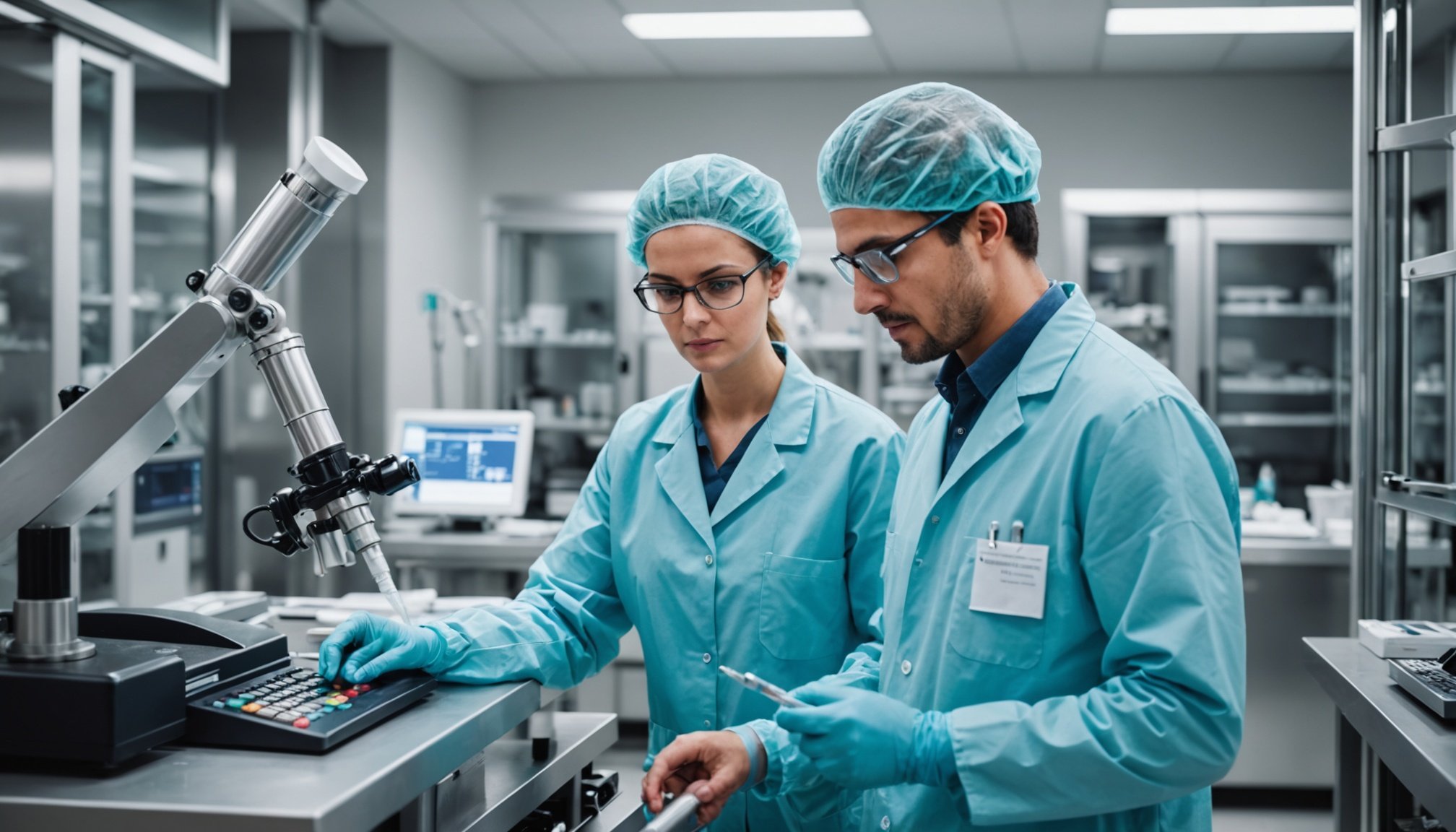Transforming Pharma Production: Leveraging AI to Streamline and Enhance Validation Methods
The pharmaceutical industry is on the cusp of a revolution, driven by the integration of artificial intelligence (AI) into various aspects of drug development, manufacturing, and validation. This transformation is not just about adopting new technologies; it’s about redefining the entire lifecycle of pharmaceutical production to make it more efficient, reliable, and patient-centric.
The Role of AI in Pharmaceutical Manufacturing
AI is no longer a buzzword in the pharmaceutical industry; it’s a game-changer. Here’s how AI is optimizing pharmaceutical manufacturing:
Also to see : Revolutionizing building management with iot: discover smarter, more efficient solutions
Manufacturing Optimization
AI-driven systems are revolutionizing the manufacturing process by reducing errors and improving product consistency. Real-time analytics allow production lines to adjust dynamically, enhancing efficiency and quality. For instance, companies like Pfizer are using intelligent automation to streamline their temperature-controlled logistics, reducing errors and boosting efficiency in the entire supply chain[1].
- Real-time analytics for dynamic adjustments
- Integration with Industry 4.0 technologies (robotics and IoT)
- Enhanced quality control through automated inspections
- Reduced lead times and greater delivery precision
Predictive Maintenance
Unexpected machine failures can be costly and disruptive in pharmaceutical production. AI-powered predictive maintenance identifies issues before they happen by analyzing sensor data from equipment. This proactive approach avoids downtime, keeping production running smoothly and maximizing efficiency and uptime[1][4].
In parallel : Harnessing blockchain technology: revolutionizing collaborative transactions in supply chain management
- Analysis of sensor data to forecast equipment failures
- Extended equipment lifespan
- Reduced downtime and increased overall efficiency
Enhancing Drug Discovery with AI
AI is not just about manufacturing; it’s also transforming the drug discovery process in profound ways.
Speeding Up Drug Discovery
AI-driven drug discovery platforms are significantly reducing the time and cost associated with bringing new molecules to the preclinical candidate stage. Companies like Exscientia and Insilico Medicine are at the forefront of this innovation. Exscientia’s Centaur Chemist platform, for example, can create molecules faster than traditional methods, with an AI-designed cancer drug entering clinical trials within just a year[1][5].
- Reduction in drug discovery costs by up to 40%
- Shortened development timelines from five years to 12-18 months
- Streamlined screening process to quickly identify promising candidates
Precision in Target Identification
AI enhances the precision of target identification and biomarker discovery, increasing the likelihood of success in clinical trials. Tools like AlphaFold predict protein structures with high accuracy, allowing researchers to understand complex proteins faster and design more effective drugs[1].
- High accuracy in predicting protein structures
- Faster understanding of complex proteins
- Design of more specific and effective drugs
AI in Quality Control and Validation
Quality control is a critical aspect of pharmaceutical manufacturing, and AI is making significant contributions here as well.
Real-Time Quality Monitoring
AI-driven analytics monitor production in real time, detecting quality issues before they become costly problems. Novartis, for example, uses smart systems to automate quality checks, ensuring that every batch of medicine meets strict safety requirements[1].
- Real-time monitoring of production parameters
- Automated quality checks
- Reduction in waste and human error
Visual Inspection Systems
AI-driven visual inspection systems are achieving higher precision and compliance than manual inspections. For instance, Takeda’s collaboration with MIT has resulted in the implementation of AI-driven visual inspection systems for injectable products, completing tasks in milliseconds with unprecedented accuracy[2].
- Higher precision and compliance
- Completion of tasks in milliseconds
- Reduction in resource demands
Impact on Supply Chain Management
The supply chain in the pharmaceutical industry is complex and highly regulated. AI is simplifying and optimizing this process in several ways.
Predictive Analytics in Supply Chain
Predictive analytics in supply chain management makes the process more transparent and reliable. Companies can use AI to analyze global data on disease prevalence, identify optimal trial sites, and enhance recruitment speed and efficiency. This also enables accurate demand forecasting, helping companies manage their inventories and avoid disruptions[2][3].
- End-to-end tracking of drugs
- Reduction in counterfeit products
- Accurate demand forecasting
- Streamlined packaging and distribution processes
Case Studies: Real-World Applications
Several case studies highlight the transformative impact of AI in the pharmaceutical industry.
Exscientia and AI-Driven Drug Discovery
Exscientia’s Centaur Chemist platform is a prime example of AI’s potential in drug discovery. By creating molecules faster than traditional methods, Exscientia has demonstrated how AI can accelerate the drug development process significantly[1].
Novartis and Real-Time Analytics
Novartis is using AI-driven analytics to monitor production in real time, detecting quality issues before they become problems. This approach has improved the reliability and efficiency of their manufacturing processes[1].
Takeda and AI-Driven Visual Inspections
Takeda’s use of AI-driven visual inspection systems for injectable products has achieved higher precision and compliance than manual inspections. This innovation has reduced resource demands and enhanced quality control[2].
Table: Comparison of Traditional vs. AI-Driven Manufacturing
| Aspect | Traditional Manufacturing | AI-Driven Manufacturing |
|---|---|---|
| Manufacturing Efficiency | Manual adjustments, prone to errors | Real-time analytics, dynamic adjustments |
| Predictive Maintenance | Reactive maintenance, frequent downtime | Proactive maintenance, reduced downtime |
| Quality Control | Manual inspections, higher error rate | Automated quality checks, higher precision |
| Supply Chain Management | Manual forecasting, higher risk of disruptions | Predictive analytics, accurate demand forecasting |
| Drug Discovery | Time-consuming, trial and error | AI-driven platforms, faster and more accurate |
| Cost and Time | Higher costs, longer development timelines | Reduced costs, shorter development timelines |
Practical Insights and Actionable Advice
For pharmaceutical companies looking to leverage AI, here are some practical insights and actionable advice:
Invest in Data Integration
Ensure that your organization has access to complete and verified data from all areas of the business. This is crucial for AI to accelerate product development and manufacturing[5].
Implement Predictive Maintenance
Use AI to analyze sensor data and forecast equipment failures. This can significantly reduce downtime and extend equipment lifespan[1][4].
Automate Quality Control
Integrate AI-driven visual inspection systems to achieve higher precision and compliance. This can reduce resource demands and enhance quality control[2].
Collaborate with AI Experts
Partner with companies that specialize in AI-driven drug discovery and manufacturing. This can help you leverage the latest technologies and expertise[1][5].
Quotes from Industry Experts
- Gabriele Ricci, Takeda: “The transformative potential of data and digital technologies in drug discovery and development is immense. These innovations are already enabling us to reimagine operations and improve both the speed and success rates of clinical trials, making the journey from discovery to market faster and more reliable.”[2]
- Coherent Solutions: “AI-enabled workflows have been shown to reduce the time and cost of bringing a new molecule to the preclinical candidate stage. For complex targets, these efficiencies could save up to 40% of time and 30% of costs.”[1]
The integration of AI into pharmaceutical production is not just a trend; it’s a necessity for staying competitive and delivering high-quality, life-saving medicines quickly and efficiently. By leveraging AI in manufacturing, quality control, and drug discovery, pharmaceutical companies can streamline processes, reduce costs, and enhance patient outcomes. As the industry continues to evolve, the partnership between humans and AI will be pivotal in shaping the future of pharmaceutical production.
In the words of Gabriele Ricci, “AI is optimizing our clinical trial processes; by analyzing global data on disease prevalence, we can more accurately identify optimal trial sites, enhancing recruitment speed and efficiency.” This is just the beginning of a new era in the pharmaceutical industry, where AI and human ingenuity come together to transform the way drugs are developed, manufactured, and delivered.











